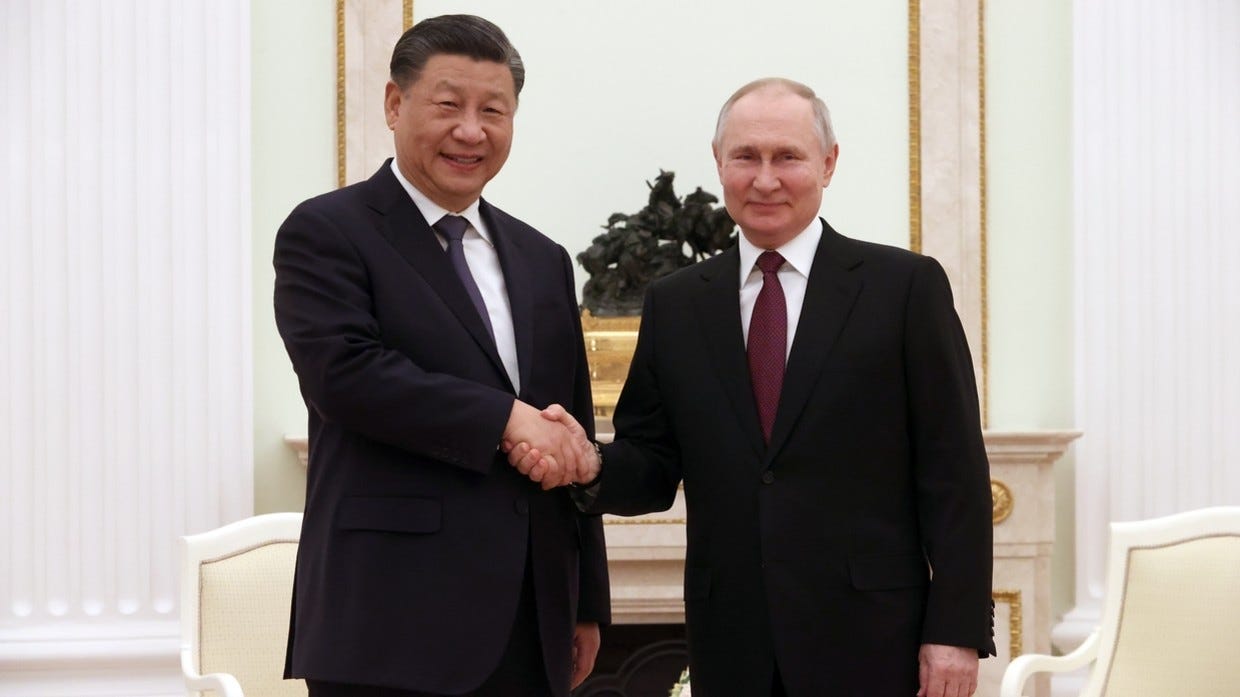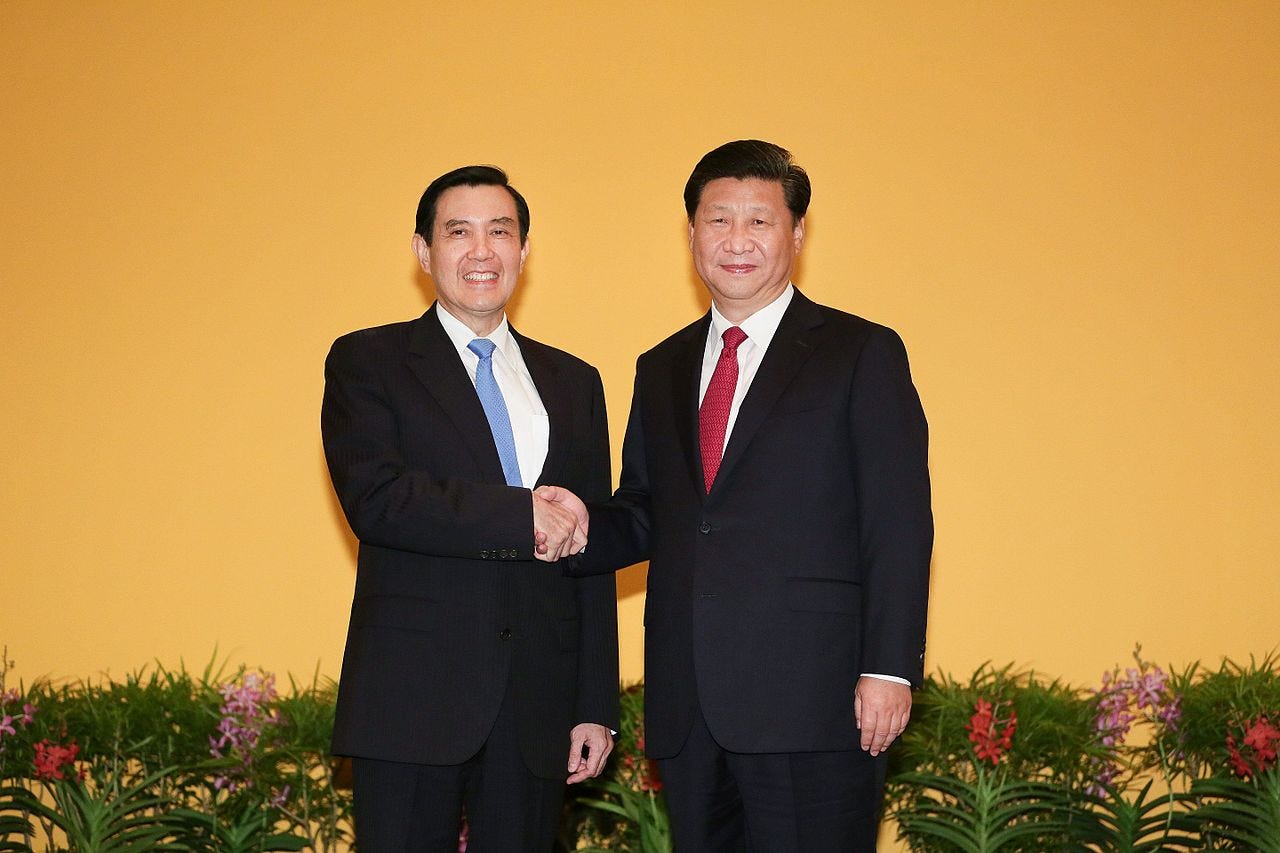When Leaders Get Scared
The US Retreat Has Huge Implications
While it may look like the United States is being tough and forceful in Ukraine, the reverse is true. The US is showing incredible weakness, and it is wearing it on its sleeve.
Let's start with Ukraine. The US has gone all out to try and help Ukraine win a victory over the Russians. The Biden administration wants this to happen for two reasons: to show that Biden is not a wimp and won't cut and run like he did in Afghanistan (and on this the 20th anniversary of the War in Iraq, like his predecessor Obama did by pulling US forces out of Iraq) and that he wants to "strengthen" NATO by eventually putting a NATO army in Ukraine.
The reason for not wanting to look like a wimp is self-evident and does not need any further explanation, other than to say that Washington elites have bought into the false narrative that Ukraine is a glowing democracy and we should defend it. Of course, the US disrupted Ukraine's free politics and pushed the rebellion against a properly elected government. Likewise the US also has kept its mouth shut about the political repression in Ukraine, the jailing of political opponents, and the complete takeover of all the media in the country. Ukraine also has mistreated the Russian speaking population, essentially putting pressure on Russian speakers to leave the country. The latest twist on this highway of suppression is Zelensky-led attacks on the Russian Orthodox Church, with the most recent manifestation closing a centuries-old monastery and forcing out the Orthodox Monks from the property. Zelensky, to make Washington happy, is pretending to go after corrupt officials in a country famous for corruption (both under the old Soviet leadership and the post-Soviet Ukrainian regimes).
But, as anyone could quickly grasp, expanding NATO is a liability for the United States and the other NATO members. By creating a border that is to be extended by thousands of miles without actually expanding NATO's military capabilities, is a disaster-in-waiting. Moreover, NATO expansion is unnecessarily destabilizing for Europe and the world, because it jacks up the tension between the two big nuclear powers in Europe, the US and Russia. While no one has honestly done the math, a target rich NATO is dangerous. Right now, neither the US or its NATO partners (rather, it should be said, very junior partners) have the wherewithal to defend the territories of NATO before the latest expansion to Finland and Sweden; and when Ukraine is added the situation becomes even more risky.
Indeed, perhaps the key accomplishment of Biden and his friends in Europe, has been to put huge sanctions on Russia. This has removed Russia as a trading, commercial, and resource partner for Europe, meaning the Russians have little to protect in Europe by way of investments and supplier and trade agreements. Even more critically, Russia has reoriented its economy to China and India, which together are well over 2.2 billion people (not counting Russia which adds another 150 million). Russia is strong on raw materials, including natural gas and petroleum, important minerals such as titanium, agriculture, especially wheat, and military technology, including rockets and nuclear. What Russia does not have is semiconductor technology, but China does.

A second major consequence of US and EU sanctions on Russia is that Russia's strategic partnership with China has now expanded, and will continue to grow. This is a challenge to the United States which saw itself as the world's Hegemon, as the sole Super Power. Whether this was ever true is open to doubt, but in the minds of Washington's policy-makers, it was indelibly implanted. It still is, but now it is demonstrably not true.
In a recent meeting of former senior military officials, almost all of them wanted to send far more weapons to Ukraine and maybe NATO forces. This kind of thinking is a great example of not understanding the US strategic position objectively, instead of ideologically and myopically.
One of the first big byproducts is the China-brokered Saudi-Iran deal restoring diplomatic ties between the two states. We do not know the full extent of the deal between Iran and Saudi Arabia, but part of the arrangement is likely economic, Saudi help for Iran in getting its economy back on track, something critical to the Iranian regime's survival. The Saudis also agreed to shut down the anti-Iran propaganda they support, and the Iranians agreed to slow down, if not stop, shipping weapons to the Houthis in Yemen, probably also pushing them to take part in peace negotiations in the country. Almost instantly, Iran's status in the region has been raised yet again. The icing on the cake was a meeting at the Ben Gurion airport in Israel between US Defense Secretary Lloyd Austin and Israeli Prime Minister Benjamin Netanyahu. While Austin affirmed that the US would "never allow Iran to acquire a nuclear weapon" he made no concrete commitment and, according to unauthorized accounts from the meeting, told Netanyahu the US would not support any attack on Iran's nuclear installations, a major setback for Israel's security. Exactly why Austin retreated isn't completely clear: it could be that US assurances to Israel are non-functional (i.e., fake). It could also be that the US has never been weaker, and any military action in the Middle East insupportable because of Ukraine.
The Saudis of course did what any country would do if it thought its main ally had taken a hike. The course the Saudis are following as a result does not necessarily augur anything good for peace and security in the Gulf region, more so after Iran has put in place a credible nuclear force with which to intimidate its neighbors.
There are some indications that Taiwan may be looking for a way to accommodate China, lest the US not support them in crunch time as China moves more forces around the island. Former Taiwan President Ma Ying-jeou, from Taiwan's Kuomintang (Nationalist) party, once headed by Chang Kai-shek, is off to China, the first visit to the Chinese mainland by a former Taiwan President since 1949. The Kuomintang is not the ruling party in Taiwan, but Ma's visit is nonetheless highly significant. He is briefing Taiwan officials before he arrives in China during the last week of March, and he has agreed to brief them on the way back. Obviously, his visit is more than a private, sentimental journey to see old relatives and visit family temples; he almost certainly will be carrying messages both ways. In the meantime, despite US rhetoric, critical defense equipment isn't being delivered to Taiwan, either because we don't have it to deliver, or the Biden administration has decided to hold up deliveries. By far the more egregious is the failure to deliver new F-16 aircraft on time, with delays said to be between two and five years. The administration says this is a manufacturing hold up, nothing more. But Taiwan's officials won't believe the excuse, and should not in any case. Meanwhile, $14 billion in defense equipment for Taiwan is delayed. Taiwan’s leaders can’t be happy or feel secure.

In short, this is what happens when allies and friends see the handwriting on the wall. How long will it be before NATO countries start to run for cover?


We have 8th graders running our country. How people like Victoria Nuland and Jake Sullivan got into positions of absolute power in the U.S. is unfathomable.
Kinda makes you wonder whose military is being depleted in Ukraine.